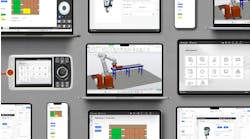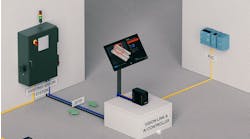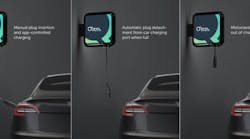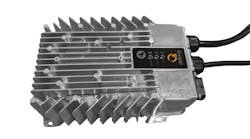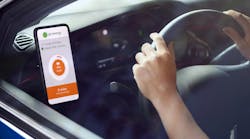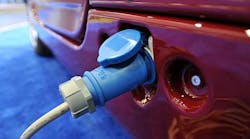Latest from Industry Trends
Recent reports indicate there are over 5.6 million electric vehicles (EVs) worldwide, representing a full 64% increase from the same time period in 2018—and the second consecutive record growth year in the zero-emissions transport market. With this progression comes commensurate concern over inadequate public EV charging infrastructure. So, it’s not surprising that the Department of Energy (DOE) indicates drivers do more than 80% of their EV automobile charging at home.
However, even amid the extreme conveniences of doing so, a multitude of safety, technological, and affordability problems persist.
As one case in point, the DOE underscores a problem for Level 1 or 2 EVSE home charging, advising that consumers “should store the charging cord securely so it is not damaged,” indicating possible scenarios that may put charging cables and cords at risk of suffering abuse like “being run over by a car.” Other more ominous reports indicate that drivers charging vehicles at home are taking dangerous risks relating to electrocution and fire like “‘daisy-chaining’—using multiple extension leads plugged into one another—to reach their car.”
That report also highlights a survey among electric vehicle owners—including all-electric and hybrids—finding that the vast majority (a whopping 74%) of respondents admit to using “domestic multi-socket extension leads, not suitable for outdoor use, to charge from the mains in their home. This is despite almost nine out of 10 respondents admitting they were aware these should not be used outdoors.”
It goes on to reveal that “over half of the electric vehicle users who charge using an extension lead, meanwhile, said they had left cables running to their vehicle in the rain.”
Explosions and the leakage of electrolyte chemicals from batteries are among other reported EV charging perils beyond electrocution and fire. Further exacerbating fears, GreenCarReports.com published eye-opening revelations that “not every home charging station on sale in the U.S. has received third-party safety certification,” and that “many charging stations sold on Amazon are not safety tested,” according to a recent investigation by Charged EVs.
These and other serious consumer hazards, coupled with a desire to generally maximize the convenience and efficacy around home EV charging, have inspired extreme innovation from Q-Reel—a smart-charging company that’s developed the world's first semi-automatic AC charging station for EVs.
Q-Reel is poised to offer global consumers intuitive and effortless charging at home with a first-of-its-kind automated ejection system ensuring a hassle-free, hands-free charging experience. This in conjunction with the associated user-friendly smartphone app and built-in camera function allows users to monitor their EV inside and out with a simple button.
Helmed by a team of Dutch entrepreneurs and engineers, the soon-to-launch Q-Reel solution presents an array of key features and benefits that will result in extreme lifestyle enhancements for EV owners.
Highlights include:
- Enhanced Safety & Equipment Integrity: Retractable cables best ensure that they will not suffer damage or abuse when not in use, while also protecting these parts from rain, humidity, and other external elements. Q-Reel also reduces the risk of electrocution and fire, thus upholding homeowner and property safety, since the fully third-party safety tested and certified system serves as an appropriate power source. It eliminates any cause to use the main home electricity source with or without extension cords/leads (or a daisy chain thereof)—especially those wires not suited for outside environments. Additionally, the flat cable inside the Q-Reel has enough cooling surface to prevent it from overheating and comes with a thermometer to regulate its temperature.
- Power-Assisted Operation: Q-Reel takes care of the ‘heavy lifting’ with regards to cable weight with its innovative automated ejection system that disconnects the plug from the car inlet and automatically retracts the cable directly back to the charging station to ensure hassle-free operation.
- Effortless Charging: Simply grab the plug and connect it to the vehicle charging port and Q-Reel will take care of the rest. Thanks to a proprietary, leading-edge automatic ejection technology, it’s ready to go when you need it.
- App-Based Monitoring and Control: Q-Reel works with an intuitive mobile app (iOS and Android) that lets users personalize charging time preferences at the swipe of a button. In addition to optimizing the charging process, users can also use the app interface to view live footage from Q-Reel’s built-in camera right from a smartphone.
- Customizable Display: Q-Reel features a customizable display that offers various personalization options. This makes it possible to add a house number, corporate logo or any other design if desired.
“In pioneering a superior EV experience from the consumer's perspective, Q-Reel intends to markedly stimulate widespread EV ownership and adaptation worldwide by easing and enhancing key home charger marketplace concerns relating to safety, usability, and affordability,” said Astrid Peters, CEO of Q-Reel.
“In removing distinct obstacles around the often complicated and time-consuming traditional charging processes, we aim to help EV drivers everywhere charge their automobiles at their own homes, without effort. Doing so will help lower the barrier-to-entry threshold, prompting more people to actually start driving electric."
